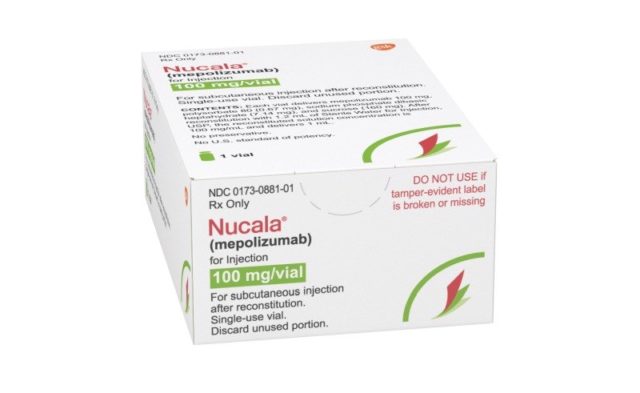
GlaxoSmithKline, caught up in an ever-increasingly competitive IL-5 respiratory market, has served up a new survey showing the frustrations of asthma patients.
GSK, which markets Nucala for severe eosinophilic asthma (SEA) among other indications, tapped Harris Poll to ask patients and doctors living or treating SEA about their overall health. The results show work needs to be done: Nearly 91% of patients said they were “very concerned” or “somewhat concerned” about their health right now.
Of patients surveyed, 9 in 10 found the path to being diagnosed with SEA “frustrating” and wish they had been diagnosed sooner. GSK would, of course, want diagnosis to be sooner and broader, as this would give patients potential access to its drug, which is expected to become a blockbuster this year.
More than two-thirds (71%) of physicians say their patients with SEA are diagnosed after they have experienced asthma symptoms and despite treatment.
When patients were asked how long it took for them to be diagnosed with SEA after they had been initially diagnosed with asthma, 34% report between one and two years and 21% report between three and four years.
Severe eosinophilic asthma is a rare and distinct phenotype of asthma that has meant more frequent asthma attacks and a lower quality of life for patients. The longer is goes undiagnosed, the more complications can arise.
RELATED: GSK’s national TV push for Nucala gives another meaning to ‘new normal’
“These survey results highlight a critical need to shorten the pathway to diagnosis and educate more directly on the treatment options available,” said Tom Corbridge, M.D.,GSK U.S. senior medical lead.
“With so many patients expressing frustration with the diagnosis process and waiting upwards of four years for an SEA diagnosis, healthcare providers, industry representatives and advocates must partner together to address their concerns and test more frequently.
“We must empower patients to speak up about their symptoms worsening and talk to the physician community about how to identify SEA patients as soon as possible to provide a personalized treatment plan.”
The plan now is for GSK to help seek out more patients with this subtype, primarily by seeking out eosinophils, white blood cells that can indicate SEA in asthma sufferers.
Traditional asthma diagnoses happen with young children, usually after five years old; with SEA, onset can happen in later adulthood and may be more difficult to spot as it presents differently. It also doesn’t respond well to inhaled corticosteroids, the typical asthma treatment pathway.
GSK said the lessons from this survey and in-practice physician and patient insights are “paving the way for new awareness efforts,” which it said are set to launch next year.
The online survey was conducted from Oct. 13 to Nov. 2, 2021, within the U.S. among 100 adults who have been diagnosed with SEA and 601 physicians, practicing in the U.S., who treat at least two patients who have been diagnosed with SEA.
RELATED: AstraZeneca drafts ‘Arrested Development’ star to promote blood tests for severe asthma
Nucala was the first IL-5 inhibitor to win FDA approval, but AstraZeneca’s IL-5 blocker Fasenra scored its own FDA nod in 2017. Adding to the competition is Sanofi and Regeneron’s Dupixent, approved to treat eosinophilic asthma in 2018.
AstraZeneca last summer teamed up with actor and asthma sufferer Tony Hale to raise awareness about the condition and its blood test for eosinophils.
Nucala, however, has been racking up the approvals of late, adding eosinophilic granulomatosis with polyangiitis as a new indication, followed by rare hypereosinophilic syndrome and, most recently, in patients with chronic rhinosinusitis with nasal polyps, which won FDA backing in the summer.
The drug made $994 million last year, up 30% on 2019, but this is expected to swell given the new indications.
GSK has been pushing its marketing for Nucala hard, more recently running a national TV ad for Nucala called “NuNormal” (though not referencing the new normal nature of COVID), which aims to recognize the ongoing awareness gap around eosinophilic asthma.






